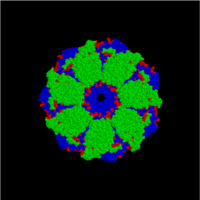
Photo from wikipedia
After ischemic stroke or cardiac arrest, brain ischemia occurs. Currently, no pharmacologic intervention that targets cellular processes has proven effective in improving neurologic outcome in patients after brain ischemia. Recent… Click to show full abstract
After ischemic stroke or cardiac arrest, brain ischemia occurs. Currently, no pharmacologic intervention that targets cellular processes has proven effective in improving neurologic outcome in patients after brain ischemia. Recent experimental research has identified the crucial role of proteostasis in survival and recovery of cells after ischemia. In particular, the unfolded protein response (UPR), a key signaling pathway that safeguards cellular proteostasis, is emerging as a promising therapeutic target for brain ischemia. For some time, the UPR has been known to play a critical role in the pathophysiology of brain ischemia; however, only in the recent years has the field grown substantially, largely due to the extensive use of UPR-specific mouse genetic models and the rapidly expanding availability of pharmacologic tools that target the UPR. In this review, we provide a timely update on the progress in our understanding of the UPR in experimental brain ischemia, and discuss the therapeutic implications of targeting the UPR in ischemic stroke and cardiac arrest.
Journal Title: Neurochemistry International
Year Published: 2021
Link to full text (if available)
Share on Social Media: Sign Up to like & get
recommendations!